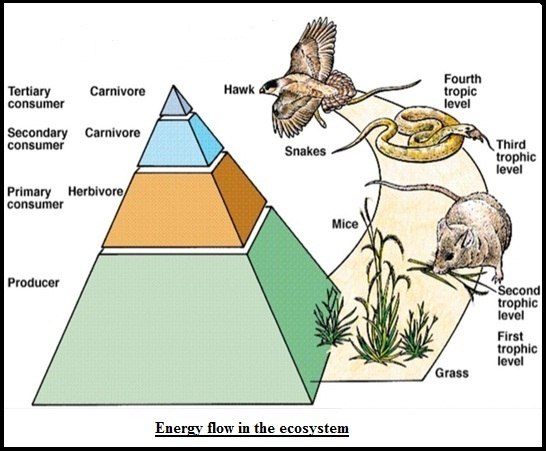Zoology Notes On – Energy Flow – For W.B.C.S. Examination.
প্রাণীবিদ্যা নোট – শক্তি প্রবাহ – WBCS পরীক্ষা।
Energy moves life. The cycle of energy is based on the flow of energy through different trophic levels in an ecosystem. Our ecosystem is maintained by the cycling energy and nutrients obtained from different external sources. At the first trophic level, primary producers use solar energy to produce organic material through photosynthesis.Continue Reading Zoology Notes On – Energy Flow – For W.B.C.S. Examination.
The herbivores at the second trophic level, use the plants as food which gives them energy. A large part of this energy is used up for the metabolic functions of these animals such as breathing, digesting food, supporting growth of tissues, maintaining blood circulation and body temperature.
The carnivores at the next trophic level, feed on the herbivores and derive energy for their sustenance and growth. If large predators are present, they represent still higher trophic level and they feed on carnivores to get energy. Thus, the different plants and animal species are linked to one another through food chains.
Decomposers which include bacteria, fungi, molds, worms, and insects break down wastes and dead organisms, and return the nutrients to the soil, which is then taken up by the producers. Energy is not recycled during decomposition, but it is released.
Biogeochemical Cycles
All elements in the earth are recycled time and again. The major elements such as oxygen, carbon, nitrogen, phosphorous, and sulphur are essential ingredients that make up organisms.
Biogeochemical cycles refer to the flow of such chemical elements and compounds between organisms and the physical environment. Chemicals taken in by organisms are passed through the food chain and come back to the soil, air, and water through mechanisms such as respiration, excretion, and decomposition.
As an element moves through this cycle, it often forms compounds with other elements as a result of metabolic processes in living tissues and of natural reactions in the atmosphere, hydrosphere, or lithosphere.
Such cyclic exchange of material between the living organisms and their non-living environment is called Biogeochemical Cycle.
Following are some important biogeochemical cycles −
- Carbon Cycle
- Nitrogen Cycle
- Water Cycle
- Oxygen Cycle
- Phosphorus Cycle
- Sulphur Cycle
Carbon Cycle
Carbon enters into the living world in the form of carbon dioxide through the process of photosynthesis as carbohydrates. These organic compounds (food) are then passed from the producers to the consumers (herbivores & carnivores). This carbon is finally returned to the surrounding medium by the process of respiration or decomposition of plants and animals by the decomposers. Carbon is also recycled during the burning of fossil fuels.
Nitrogen Cycle
Nitrogen is present in the atmosphere in an elemental form and as such it cannot be utilized by living organisms. This elemental form of nitrogen is converted into combined state with elements such as H, C, O by certain bacteria, so that it can be readily used by the plants.
Nitrogen is being continuously expelled into the air by the action of microorganisms such as denitrifying bacteria and finally returned to the cycle through the action of lightening and electrification.
Our own publications are available at our webstore (click here).
For Guidance of WBCS (Exe.) Etc. Preliminary , Main Exam and Interview, Study Mat, Mock Test, Guided by WBCS Gr A Officers , Online and Classroom, Call 9674493673, or mail us at – mailus@wbcsmadeeasy.in
Visit our you tube channel WBCSMadeEasy™ You tube Channel
Please subscribe here to get all future updates on this post/page/category/website



 +919674493673
+919674493673  mailus@wbcsmadeeasy.in
mailus@wbcsmadeeasy.in






































































































